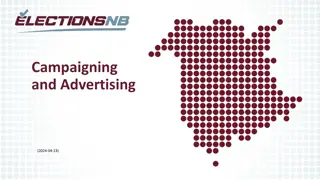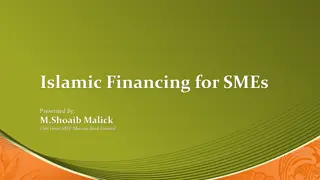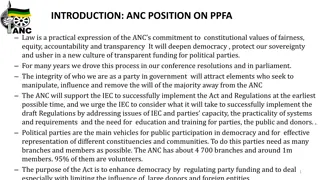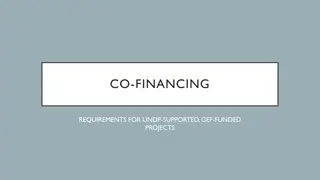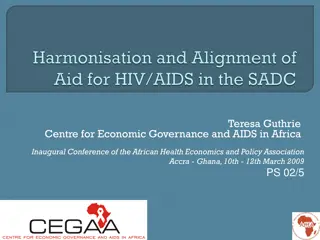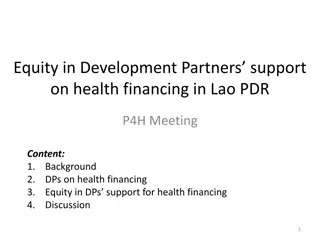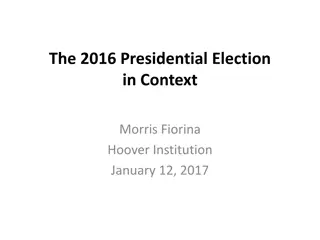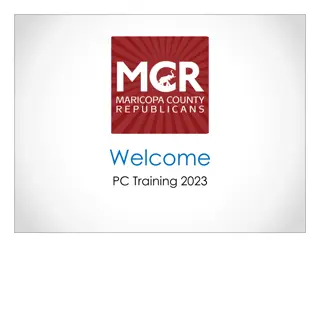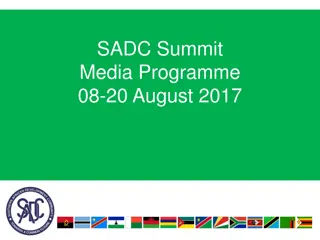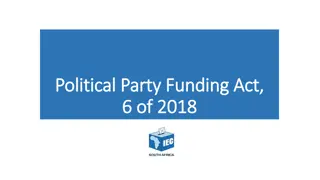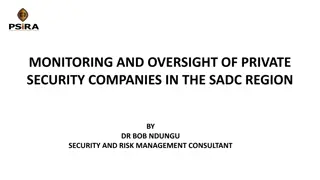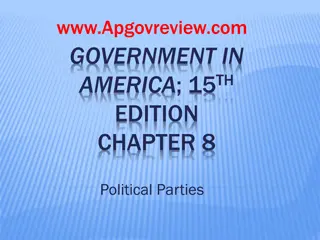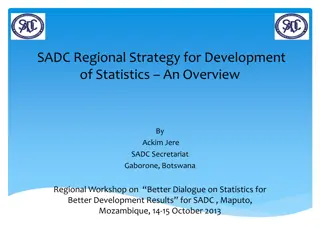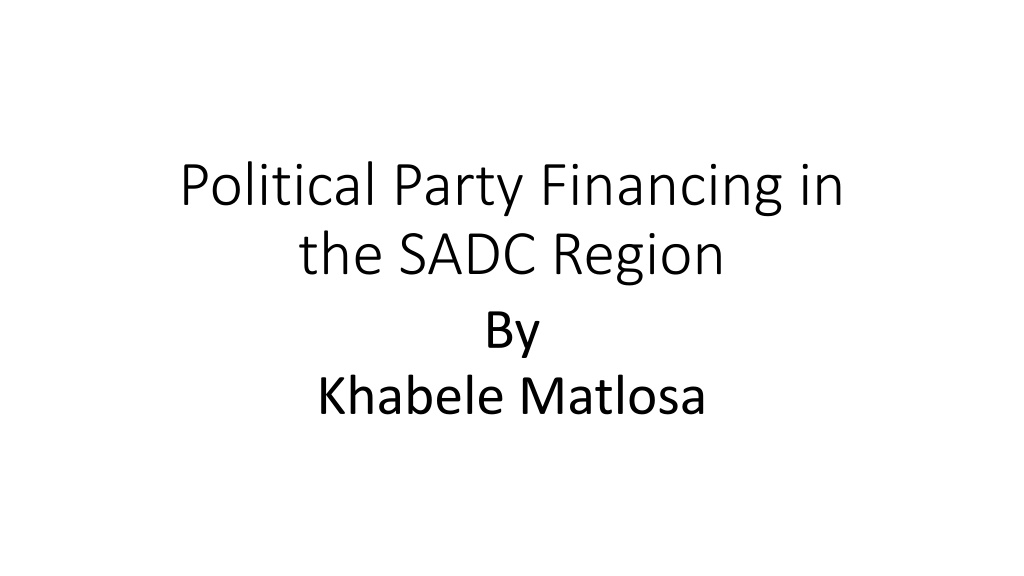
Understanding Political Party Financing in the SADC Region
Delve into the intricate landscape of political party financing in the SADC region, exploring the significance of parties in democracy, funding sources, regulatory frameworks, and reform recommendations. Gain insights into the role of political parties as key players in representative democracy and the importance of transparent and accountable party funding processes.
Download Presentation

Please find below an Image/Link to download the presentation.
The content on the website is provided AS IS for your information and personal use only. It may not be sold, licensed, or shared on other websites without obtaining consent from the author. If you encounter any issues during the download, it is possible that the publisher has removed the file from their server.
You are allowed to download the files provided on this website for personal or commercial use, subject to the condition that they are used lawfully. All files are the property of their respective owners.
The content on the website is provided AS IS for your information and personal use only. It may not be sold, licensed, or shared on other websites without obtaining consent from the author.
E N D
Presentation Transcript
Political Party Financing in the SADC Region By Khabele Matlosa
Outline Outline Introduction Significance of Political Parties Role of Political Parties in Democracy Sources and Nature of Party Financing Regulation of Party Financing Party Financing Reforms Recommendations
Introduction Introduction Centrality of parties to representative democracy; In order to enhance their effectiveness, parties need resources, esp. funding; Evidence suggests that party funding is both an asset (a cure) and a liability (a curse); Key questions: Why are parties important? How do parties get funds? How transparent is the party funding process? How are these funds regulated? To whom are parties accountable? How do citizens perceive party funding?
Significance of Political Parties? Significance of Political Parties? In representative or indirect democratic systems, parties are key players; These are organised groups of people with at least roughly similar political aims and opinions, that seek to influence (control and direct) public policy by getting their candidates elected in public office (http://aceproject.org); Political parties are groups of people who have come together in pursuit of common socio-cultural and politico-economic goals (Hess, 1994); They are organized for the purpose of winning governmental power, by electoral or other constitutional means (Salih, 2003; Heywood, 2013;); For this purpose, political parties seek to place candidates in governmental office under their own specific labels. Parties are among the most important organisations in modern politics (Heywood, 2013).
Significance (Cont.) Significance (Cont.) Political parties are evidently distinguishable from other organised societal formations (interest groups, social movements, civil society etc) in four (4) important ways: Parties aim to exercise governmental power by winning political office, Parties are organised bodies with a formal card-carrying membership; Parties typically adopt a broad issue focus, addressing each of the major areas of government policy; and Parties are united by a commonly shared programme and ideological identity
Significance (Cont.) Significance (Cont.) The six (6) main functions of parties in any democratic system are to: Aggregate and articulate needs and problems of members and supporters; Socialize and educate voters and citizens in the functioning of the political and electoral system and generating general political values; Balance opposing demands and convert them into general policies; Activate and mobilize citizens into participating in political decisions and transforming their opinions into viable policy options; Channel public opinion from citizens to government; and Recruit and train candidates for public office (see http://aceproject.org; Heywood, 2013).
Role of Political Parties Role of Political Parties The main functions of political parties are mainly three-fold: Interest articulation; Interest aggregation; Recruitment.
Role of Political Parties Role of Political Parties Party Position Ruling Interest Articulation Implement policies Interest Aggregation Sustain electoral support for government Gain electoral Support for change Recruitment Fill government positions Opposition Develop alternatives Build pool of competent people
Party Financing Party Financing The concept, party finance or political finance encompasses all financial flows to and from political parties and candidates; It includes formal and informal income and expenditure as well as financial and in-kind contributions (IDEA Political Finance Database); Parties and candidates need finances in order to mobilise support and be effective in competing for state power (Biezzen, 2003; IDEA, 2014); So, party financing plays a positive role in entrenching multi-party (representative) democracy; However, if not regulated, money may have a corrosive impact on democracy through corruption, fraud, illicit financial flows etc; If unattended, political corruption can erode democratic governance.
Sources of Financing Sources of Financing Parties have various sources of financing; These include the following: State; Foreign donors (governments, parties, foundations etc); Private sector; Civil society (e.g. trade unions, churches etc) Party s own business operations; Philanthropy donations; Levy on its representatives in govt; Diaspora funding; Membership fees and fund-raising activities.
Nature of Financing Nature of Financing Elections (campaigns, nominations, voter education, rallies, party agents); Democracy development (civic education); Representational functions (constituency development fund); Institutional development (office, equipment, party regalia); Intra-party democracy (elective conferences, party leadership, women s league, youth league, local structures etc)
Nature of Financing Nature of Financing In SADC, membership subscriptions are negligible, esp. for bigger parties; Parties do occasionally embark on fund-raising esp. around election time; In some SADC countries, bigger parties (both ruling and opposition) also run their own business ventures; Almost all political parties compel their representatives in parliament and executive to pay a predetermined levy on a monthly basis; This system also applies to party members working as public servants.
Nature of Financing Nature of Financing Eleven (11) SADC countries provide for public funding of parties (e.g. Angola, DRC, Lesotho, Madagascar, Malawi, Mozambique, Seychelles, South Africa, Tanzania, Zambia, Zimbabwe); This applies to parties represented in the legislature and/or participating in elections; The formula may involve either proportionality or equity or both; The formula for party funding has remained a source of controversy; While public funding is regulated in those countries where it exists, private funding is not regulated in many countries with the exception of South Africa.
Trust in institutions and leaders | 34 countries | 2019/2021 Religious leaders 66% Army 63% Traditional leaders 51% Presidency 49% Police 46% National electoral commission 39% Local government councillors 38% Ruling party 36% Parliament 36% Opposition party 31% 0% 20% 40% 60% 80% 100% Respondents were asked: How much do you trust each of the following, or haven t you heard enough about them to say? (% who say they trust them somewhat or a lot ) (Trust in ruling and oppostition countries not asked in Tunisia)
Mistrust in Political Parties Mistrust in Political Parties Country Mistrust in Ruling Parties (%) Mistrust in Opposition Parties (%) 62 55 70 60 76 Madagascar Malawi South Africa Zambia Lesotho 67 65 60 44 50
Mistrust in Political Parties Mistrust in Political Parties Country Mistrust in Ruling Parties (%) Mistrust in Opposition Parties (%) 70 59 58 51 57 62 Mauritius Zimbabwe Botswana Mozambique Tanzania Namibia 69 39 45 38 34 40
Party Financing Reforms Party Financing Reforms Calls for the regulation, disclosures, transparency and ceilings on private funding resisted by bigger parties (both ruling and opposition alike); Such calls have been resisted by bigger parties and by private business interests providing this funding; In many instances, private funding is channeled to the ruling parties alone as an incentive for acquisition of government tenders; In others, private interests provide funds to both ruling and opposition parties alike, especially in situations of unstable coalition governments (e.g. Chinese business tycoon in Lesotho);
Party Financing Reforms Party Financing Reforms Continental Normative framework: The 2007 (AU) African Charter on Democracy, Elections and Governance provides for strengthening of the capacity of political parties and equal access to public resources; The 2003 (AU) African Convention on Preventing and Combating Corruption provides for transparency in political party finance and prohibits use of funds from illegal or corrupt practices. Regional Normative Framework: The 2001 SADC-PF Norms and Standards for Elections in SADC provide that parties should be provided with public funding and be accountable in its use; The 2004 SADC Principles and Guidelines Governing Democratic Elections provide that funding of political parties must be transparent and based on the agreed threshold;
Party Financing Reforms Party Financing Reforms 2003 EISA/ECF Principles for Elections Management, Monitoring and Observation (PEMMO) in the SADC Region provides that: The use of public assets and funds for political purposes should be regulated in order to level the playing field for political competition; Political parties should be held accountable to the EMBs on the use of such resources; 2018 SADC Model Law on Elections provides that parliament shall enact a law to make provision for financing of parties and candidates with clear rules and procedures to ensure level playing field. The above continental and regional normative frameworks for regulation and transparency in party financing is complimented by national regulatory frameworks including electoral laws, codes of conduct etc.
Party Financing Reforms Party Financing Reforms Reforms are needed for providing funding to political parties where non exists; In many SADC countries, regulation of public funding of parties is controversial and needs reforming; In all SADC, private donations are not regulated at all and pose a risk to the consolidation of democracy; Legal and institutional frameworks are lacking or weak in ensuring regulation and transparency of party financing; While in other countries the CSOs & media are vibrant and robust in playing their watch-dog role, in others, they are enfeebled.
Party Financing Reforms Party Financing Reforms Why regulate Party Financing: Prevent abuse and the buying of influence in parties; Level playing field of competition between parties; Empower citizens and voters (right to know); Strengthen and develop political parties (internal democracy) (IDEA, 2005:170).
Party Financing Reforms Party Financing Reforms Four possible strategies for regulating party financing; Autonomy option: self-regulation Transparency option: disclosure Advocacy option: institutional enforcement; Diversified regulation option: all the above
Party Financing Reforms Party Financing Reforms There is no perfect model of regulation; However, the diversified regulation model may prove more useful for SADC countries provided the following seven (7) principles are adhered to: Disclosure Transparency Accountability Oversight Limits Incentives Sanctions
Recommendations Recommendations Parliament must enact enabling legislation for provision of public funding to political parties and candidates premised on an agreed formula governed by three principles of non-discrimination, proportionality and equity; Parliament must pass a law governing national and foreign private funding to political parties and candidates as part of combatting corruption predicated on the seven principles as follows: disclosure, transparency, accountability, oversight, limits, incentives and sanctions; Parliament must ensure that adequate resources from the national budget are earmarked for the enhancement of the institutional capacity of the institution tasked with oversight over funding of political parties and candidates to ensure prudent use of public funds and adequate accountability to parliament;
Recommendations Recommendations Parliament must enact a law that governs use of state resources during elections with a view to create a level playing field between ruling and opposition parties and candidates. Parliament must enact or strengthen existing legislation to ensure that anti-corruption bodies, civil society organizations and the media play their rightful watch-dog roles in combating political corruption linked to funding of political parties and candidates.
Useful Resources Useful Resources Administration and Cost of Elections (ACE) Encyclopedia, http://aceproject.org. Biezzen, I. 2003. Financing political parties and election campaigns guidelines, Council of Europe, Strasbourg, Germany. Breth, E. and Quibell, J. 2003. Best Practices of Effective Parties: Three training modules for political parties, National Democratic Institute, Washington DC, United States of America. Falguera, E., Jones, S., and Ohman, M. eds. 2014. Funding of Political Parties and Election Campaigns: A Handbook on Political Finance, IDEA: Stockholm. Heywood, A.2013. Politics, Fourth Edition, London: The Palgrave MacMillan. Matlosa, K. 2007. Political Parties in Southern Africa: The State of Parties and their Role in Democratization. Stockholm: IDEA Research Report. Salih, M. 2003. African Political Parties: Evolution, Institutionalisation and Governance, London: Pluto Press.
About the Author About the Author Khabele Matlosa Visiting Professor Centre for African Diplomacy and Leadership University of Johannesburg Auckland Park South Africa Tel: +26657984471 Email: khabelematlosa@rocketmail.com; matlosak@gmail.com


